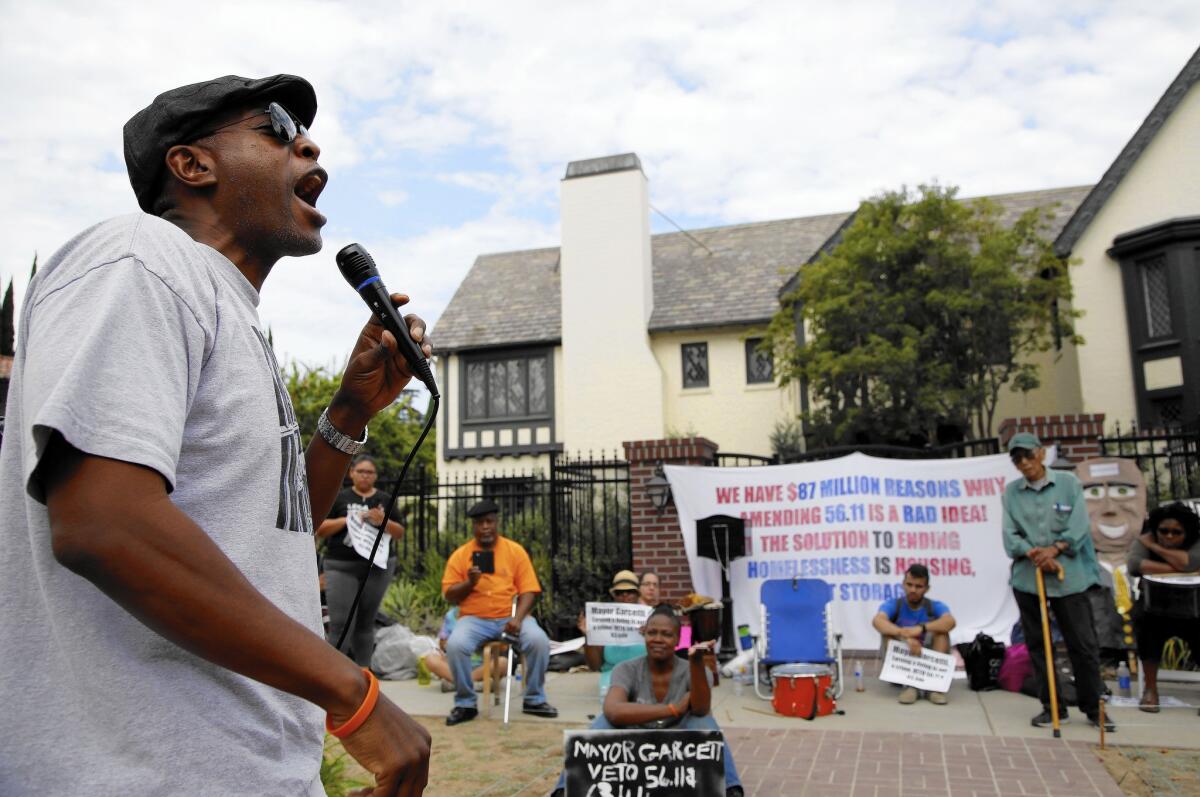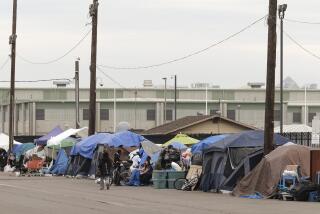Garcetti stance on homeless crackdown draws critics from both sides

- Share via
Faced this week with a choice between signing or vetoing controversial legislation that would crack down on homeless encampments, Mayor Eric Garcetti charted a complex middle course.
Resorting to a peculiarity of Los Angeles’ legislative process, he said he would allow the measures to become law without his formal approval. At the same time, he said he would block their enforcement until the City Council softened some of the new rules’ harsher provisions.
------------
FOR THE RECORD:
Homeless crackdown: In the July 3 California section, an article about Mayor Eric Garcetti’s stance on a crackdown on homeless encampments referred to the mayoral residence as being in Hancock Park. It is in Windsor Square. —
------------
The decision seemed to have a political logic, appeasing advocates of gentler solutions to Los Angeles’ growing homelessness and residents pleading for tougher action against trash-strewn tarpaulin settlements that have spread throughout the city, particularly downtown and in beachfront Westside neighborhoods.
But if conciliation was the goal, Garcetti appears to have achieved something different. Instead of pacifying either camp, he has angered partisans in both, leading to a rare moment of agreement between supporters and opponents of the new regulations as they criticize his leadership.
“If he doesn’t agree with [the ordinances], he should veto them. He needs to take leadership on this issue, not stand in the middle,” said Thelmy Perez, a housing activist who opposes the ordinances and joined several dozen like-minded demonstrators Thursday morning outside the mayoral residence in Hancock Park.
Mark Ryavec, president of the Venice Stakeholders Assn. and a proponent of tougher restrictions on encampments, offered a similarly harsh assessment of what he described as Garcetti’s “stumbling, uncoordinated” approach to homelessness.
“His attitude to try to reclaim some ground with community homeless advocates just blunts all the good that could come out of the two ordinances for residents and the community,” Ryavec said. “He shows great promise in many areas, but this is not one of them. It’s going to take a certain toughness the mayor has not shown.”
In an interview Wednesday, Garcetti said he would not sign the ordinances because he wanted better safeguards against the confiscation of important personal items such as prescription medications and identification cards. He has also said he wants to reduce the laws’ criminal penalties for homeless violators.
“Those are important to me, that it be humane,” he said. “We need to have an ordinance in place, but I wanted it to have that in it. And the one that went through didn’t have that, so I’m not signing it.”
He said he opted not to veto the plan because “I have the power to make sure that it isn’t enforced, so I feel secure about that.”
Confused messaging from the administration has compounded questions about where Garcetti stands. As the council prepared for a final vote on the plan to sweep encampments last week, mayoral spokesman Jeff Millman said Garcetti would sign the ordinances and work with council members to improve them. This week, the mayor said Millman misrepresented his position.
“Jeff told people without ever checking with me that, ‘Oh, he’s probably going to sign it,’ ” Garcetti said. “I never said that to staff, or internally.” Millman did not dispute the mayor’s account of the miscommunication, but said his previous statement “offered a preliminary view prior to [the ordinances’] passage in council.”
The ordinances, passed 12 to 1 by the council last week, are aimed at one of Los Angeles’ most recognizable — and legally treacherous — social problems.
The city has fought losing court battles over police officers’ authority to sweep the homeless from the streets and impound their belongings. The two new ordinances, one for parks and one for sidewalks, are meant to create a defensible method for doing just that, giving the homeless 24 hours to move once they are put on notice. After that, police would be authorized to seize their possessions and either ticket or charge them with a misdemeanor.
Supporters, among them shopkeepers and homeowners, say that the bills are necessary to check the spread of encampments. Opponents say they criminalize homelessness.
Even with the changes sought by the mayor, some homeless advocates say that the laws would remain deeply flawed. Maria Foscarinis, executive director of the National Law Center on Homelessness and Poverty, said the proposed amendments “are tinkering around the edges of laws that are fundamentally misguided and wrong.”
Questions also linger about Garcetti’s authority to block the ordinances from taking effect. The City Charter dictates that without his signature or veto, the measures will become law — in effect the reverse of the “pocket veto” whereby U.S. presidents block legislation by not signing it. After that, the mayor asserts, he can order the police not to apply the new laws until they are amended to address his concerns.
UC Irvine School of Law professor Erwin Chemerinsky, who helped write the current version of the City Charter, said an across-the-board policy directing police officers to ignore a law would have to come from the Police Commission, not the mayor’s office. In practice, Chemerinsky noted, the mayor appoints police commissioners, giving him heavy influence over such an action.
He suggested that the veto power granted the mayor under the City Charter would be a simpler way to prevent the laws from taking effect. The council can override vetoes with a two-thirds vote.
“I do not understand why he did not veto this since he finds it objectionable,” Chemerinsky said.
Los Angeles Police Cmdr. Andrew Smith said officers have the discretion to hold off on enforcing the ordinances — with an exception. If called to assist in a citizen’s arrest for an alleged violation of an enacted law, the LAPD would be required to enforce it, Smith said.
“If it is a valid law and a private individual requests an arrest, then officers have to make that arrest,” Smith said.
The city attorney’s office did not respond to questions about the legality of Garcetti’s plan to block enforcement of the ordinances.
Police Commission President Steve Soboroff said he thought it was prudent to defer enforcing the new laws or retraining officers to deal with the homeless encampments.
“We’ll be far better off served when a little more thought is put into this,” Soboroff said. “Putting cops in the middle of a social issue is very difficult, but that’s what’s happening now.”
Times staff writer Richard Winton contributed to this report.
More to Read
Sign up for Essential California
The most important California stories and recommendations in your inbox every morning.
You may occasionally receive promotional content from the Los Angeles Times.











